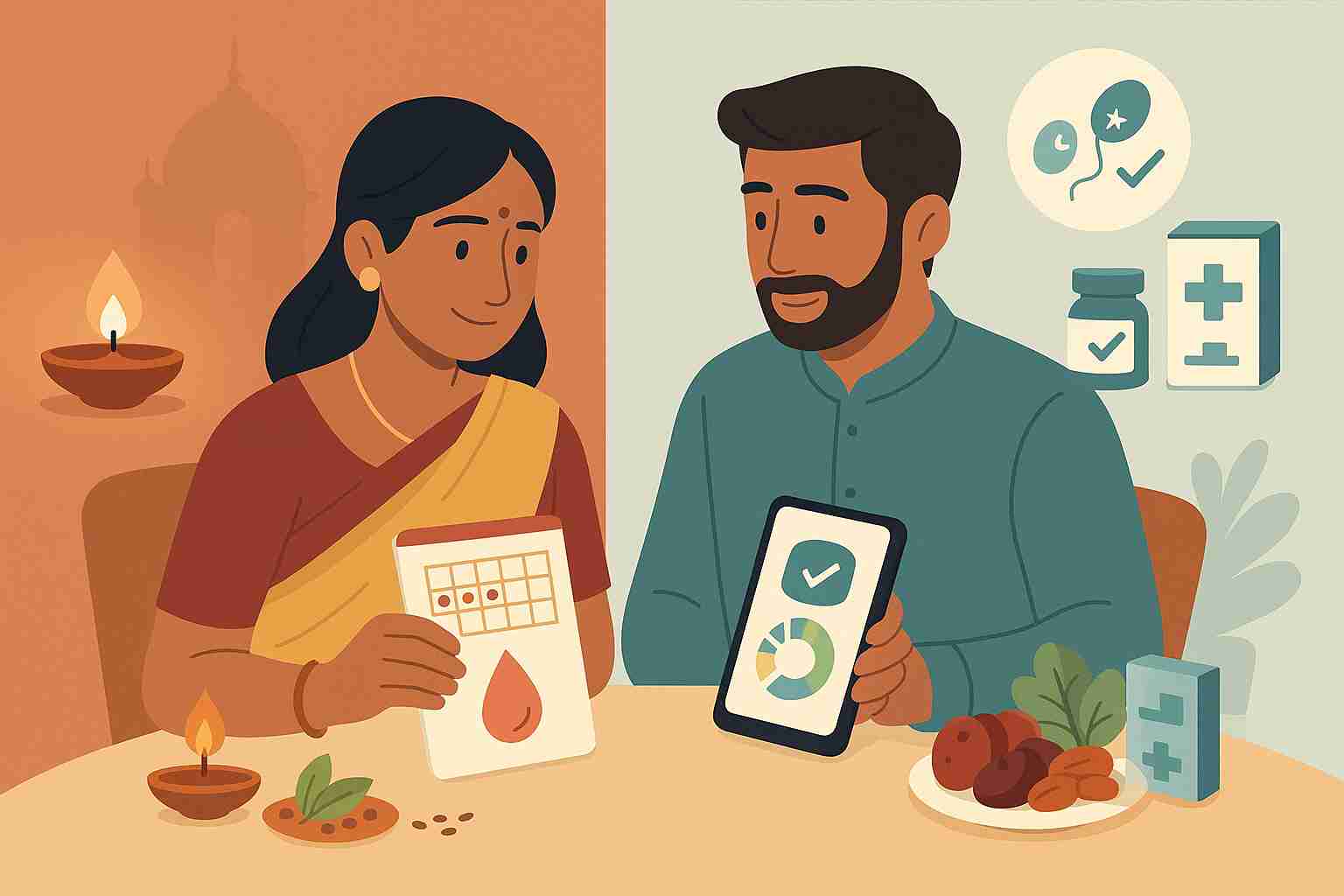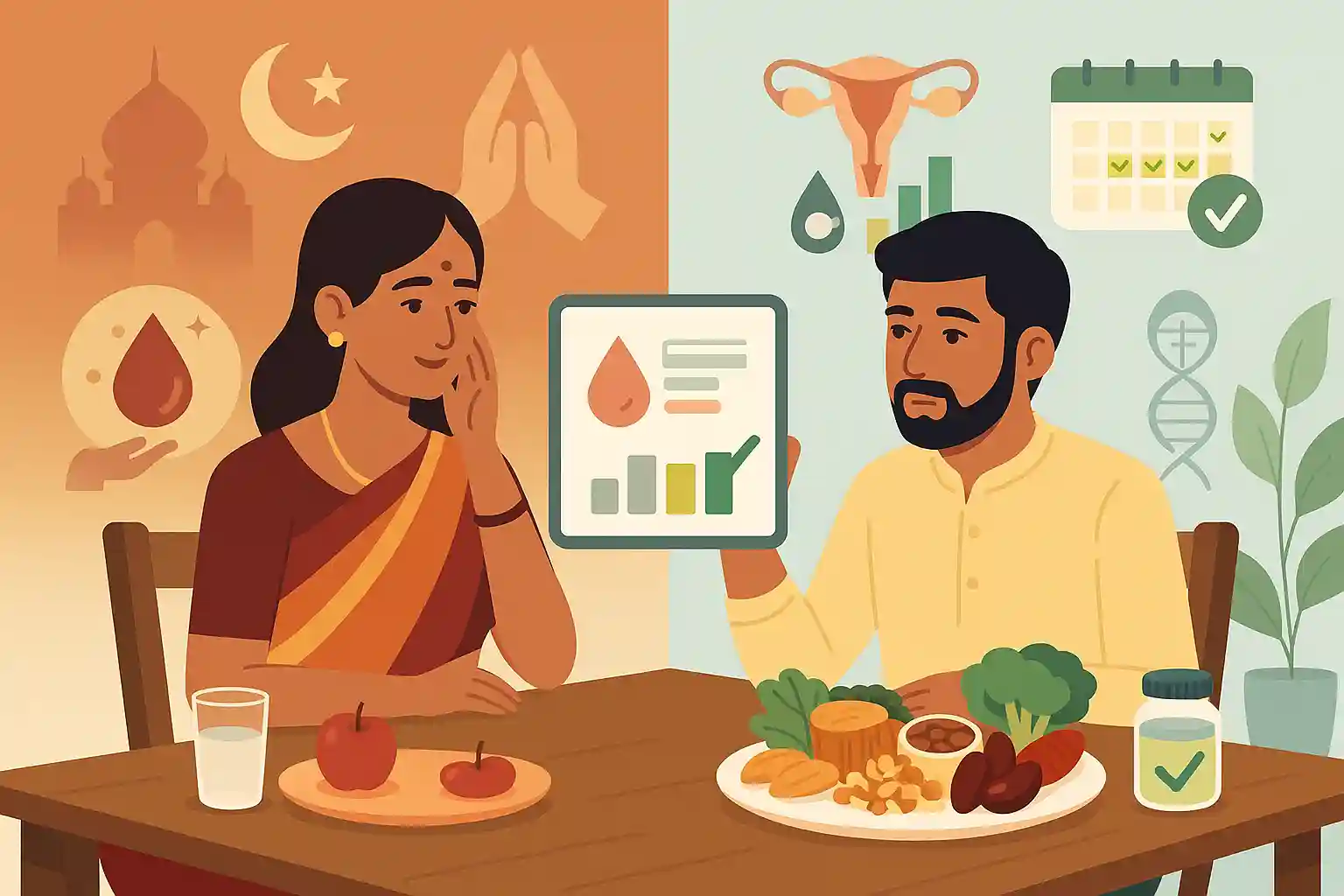"My mother-in-law insists I should eat ghee and almonds, while my doctor recommends folic acid supplements. Who should I listen to?" This dilemma faces countless Indian couples trying to conceive. The truth is, you don't have to choose sides. The smartest fertility planning combines evidence-based traditional wisdom with modern medical science.
Many traditional Indian practices have solid scientific backing, while others need updating. Here's how to create a fertility plan that honors your heritage while maximizing your chances of conception.
Traditional Practices That Science Confirms
Ancient Wisdom That Works:
- Ghee consumption: Rich in fat-soluble vitamins A, D, E, K essential for hormone production
- Almonds and dates: High in vitamin E, zinc, and folate crucial for fertility
- Turmeric (haldi): Anti-inflammatory properties improve reproductive health
- Yoga and pranayama: Reduces stress hormones that interfere with ovulation
- Early dinner timing: Supports better sleep and hormone regulation
Seasonal Timing Wisdom:
- Avoiding conception during extreme summer (April-June): Science confirms heat stress affects fertility
- Post-monsoon conception (September-November): Optimal vitamin D levels and reduced infections
- Traditional 3-year gap between pregnancies: Allows full nutritional recovery
Myths That Need Modern Updates
Traditional Beliefs to Reconsider:
- "Eating for two during pregnancy": Modern advice is quality over quantity
- Avoiding all physical activity: Moderate exercise actually improves fertility
- Only trying after specific age (25+): Earlier conception may be healthier for some
- Gender selection through diet: No scientific evidence supports these claims
- Complete bed rest during early pregnancy: Not recommended unless medically indicated
Superstitions vs Science:
- Eclipse affecting pregnancy: No scientific basis
- Specific positions guaranteeing conception: Sperm motility matters more than gravity
- Avoiding certain foods during periods: Nutritional needs remain the same
- Astrology determining conception timing: Ovulation cycles are biological, not cosmic
Integrating Traditional Nutrition with Modern Supplements
Smart Combination Approach:
- Traditional ghee + Modern folic acid: Both support neural tube development
- Almonds and dates + Iron supplements: Traditional foods enhance iron absorption
- Turmeric in cooking + DHA supplements: Anti-inflammatory benefits plus brain development
- Sesame seeds (til) + Calcium tablets: Multiple calcium sources for bone health
Daily Meal Planning:
- Morning: Soaked almonds (traditional) + prenatal vitamin (modern)
- Lunch: Dal with turmeric + iron-rich vegetables + vitamin C source
- Evening: Dates and milk (traditional energy) + calcium supplement if needed
- Dinner: Light, early meal with ghee for hormone production
Modern Science Enhanced by Traditional Practices
Ovulation Tracking:
- Modern apps + Traditional body awareness: Notice cervical mucus changes
- Ovulation kits + Menstrual cycle tracking: Combine technology with body signals
- Temperature tracking + Ayurvedic body constitution understanding
- Medical monitoring + Traditional rest practices during fertile window
Stress Management Integration:
- Medical counseling + Yoga and meditation
- Fertility treatments + Family support systems
- Hormone therapy + Ayurvedic stress-reduction techniques
- Modern therapy + Traditional community rituals for emotional support
Family Involvement: Balancing Support and Pressure
Positive Family Contributions:
- Nutritional support: Traditional fertility foods prepared by elders
- Emotional support: Extended family network during fertility journey
- Practical help: Reduced household stress for conceiving couple
- Financial support: Family pooling resources for fertility treatments
- Experience sharing: Learning from successful pregnancies in family
Managing Family Pressure:
- Set boundaries: Medical decisions remain with couple and doctor
- Educate family: Share modern fertility facts to reduce superstitions
- Timeline communication: Be clear about your planning approach
- Cultural sensitivity: Respect traditions while maintaining autonomy
- Professional support: Use counseling to navigate family dynamics
Pre-Conception Planning: Best of Both Worlds
3-Month Preparation Plan:
- Medical checkup + Ayurvedic consultation for body constitution
- Modern fertility testing + Traditional detoxification practices
- Supplement regimen + Seasonal diet adjustments
- Exercise routine + Yoga and meditation practice
- Stress management + Family blessing and support
Traditional Body Preparation:
- Panchakarma (if medically cleared): Ayurvedic detoxification
- Oil massage (abhyanga): Improves circulation and reduces stress
- Herbal teas: Shatavari, ashwagandha under expert guidance
- Seasonal eating: Align diet with natural cycles
- Early sleep schedule: Support natural hormone rhythms
Evidence-Based Traditional Foods for Fertility
For Women:
- Shatavari: Research shows it may support ovarian function
- Fenugreek seeds: High in iron and may regulate menstrual cycles
- Pomegranate: Antioxidants support egg quality
- Coconut: Healthy fats for hormone production
- Black sesame seeds: Rich in calcium and healthy fats
For Men:
- Ashwagandha: Studies show improved sperm count and motility
- Pumpkin seeds: High in zinc essential for testosterone
- Walnuts: Omega-3 fatty acids improve sperm quality
- Garlic: May improve blood flow to reproductive organs
- Dark leafy greens: Folate important for sperm DNA
Modern Medical Care with Cultural Sensitivity
Choosing Healthcare Providers:
- Find doctors who respect traditional practices
- Seek providers with cultural competency
- Look for integrative medicine approaches
- Ensure clear communication about combining treatments
- Choose facilities that accommodate family involvement appropriately
Treatment Integration:
- Inform medical team about traditional practices you're following
- Ask about interactions between herbs and medications
- Time traditional practices around medical treatments
- Use traditional stress-relief during medical procedures
- Maintain cultural rituals that provide emotional support
Cost-Effective Fertility Planning
Budget-Friendly Traditional Approaches:
- Home yoga practice vs expensive fertility yoga classes
- Traditional foods vs expensive superfoods
- Family cooking vs fertility-specific meal plans
- Community support vs expensive counseling sessions
- Seasonal eating vs year-round expensive supplements
Smart Healthcare Investment:
- Basic fertility testing: ₹5,000-10,000
- Traditional consultation: ₹1,000-3,000
- Quality supplements: ₹2,000-4,000/month
- Yoga classes: ₹1,000-2,000/month
- Regular monitoring: ₹2,000-3,000/month
Creating Your Integrated Fertility Plan
Daily Routine Integration:
- Morning: Traditional practices (yoga, soaked almonds) + modern supplements
- Meals: Seasonal traditional foods + scientifically-backed nutrition
- Evening: Family time and support + individual couple planning
- Night: Traditional relaxation practices + modern sleep hygiene
Monthly Planning Cycle:
- Week 1: Medical monitoring + traditional cleansing practices
- Week 2: Ovulation tracking + traditional fertility foods
- Week 3: Stress management + family support engagement
- Week 4: Rest and reflection + planning for next cycle
When to Prioritize Modern Medicine
Situations Requiring Medical Priority:
- Age over 35 for women or 40 for men
- Trying for over 6 months without conception
- Known medical conditions affecting fertility
- History of pregnancy loss or complications
- Severe symptoms requiring immediate attention
The Bottom Line
The best fertility planning doesn't require choosing between traditional wisdom and modern science—it requires thoughtfully combining both. Many traditional Indian practices have strong scientific backing and can enhance modern fertility treatments when used appropriately.
Honor your cultural heritage while embracing medical advances. Use family support systems while maintaining your autonomy. Follow traditional nutritional wisdom while ensuring you meet modern nutritional requirements for pregnancy.
The goal is a healthy pregnancy and baby, and that's best achieved through an integrated approach that respects both ancient wisdom and contemporary science. Start planning with both your heritage and your health in mind.



